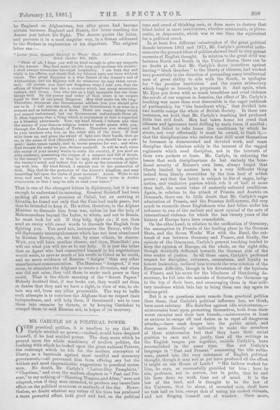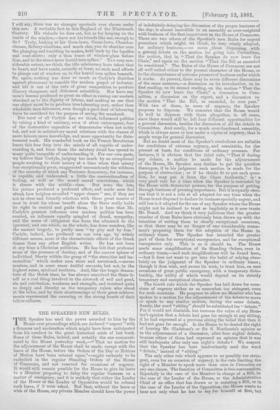MR. CARLYLE AS A POLITICAL POWER.
OVER practical politics, it is needless to say that Mr. Carlyle wielded no power,—indeed, would have despised himself, if he had wielded power. The deep scorn which he poured upon the whole machinery of modern politics, the loathing with which he looked upon the great national Palaver, the contempt which lie felt for the modern conception of liberty, as a barricade against most needful and necessary government,—all prevented him from offering any but the wildest and most impracticable suggestions to practical states- men. No doubt, Mr. Carlyle's " Latter-Day Pamphlets," " Chartism," and even the modern chapters in " Past and Pre- sent," to say nothing of " Shooting Niagara, and After," were not adapted, even if they were intended, to produce any immediate effect on the political measures or methods of the day. Never- theless, we doubt whether any writer of his time has produced a more powerful effect, both good and bad, on the political OVER practical politics, it is needless to say that Mr. Carlyle wielded no power,—indeed, would have despised himself, if he had wielded power. The deep scorn which he poured upon the whole machinery of modern politics, the loathing with which he looked upon the great national Palaver, the contempt which lie felt for the modern conception of liberty, as a barricade against most needful and necessary government,—all prevented him from offering any but the wildest and most impracticable suggestions to practical states- men. No doubt, Mr. Carlyle's " Latter-Day Pamphlets," " Chartism," and even the modern chapters in " Past and Pre- sent," to say nothing of " Shooting Niagara, and After," were not adapted, even if they were intended, to produce any immediate effect on the political measures or methods of the day. Never- theless, we doubt whether any writer of his time has produced a more powerful effect, both good and bad, on the political
tone and creed of thinking men, or done more to destroy that blind belief in mere institutions, whether aristocratic, or pluto- cratic, or democratic, which was at one time the equivalent for a political creed. In at least five different 'catastrophes of the great political decade between 1861 and 1871, Mr. Carlyle's powerful influ- ence over the ground-ideas of politics showed itself in very potent currents of English thought. In relation to the great civil war between North and South in the United States, there can be no doubt at all that Mr. Carlyle's fierce invectives against leaving '° black QuasInee " to the liberty of idleness, had worked very powerfully in the direction of persuading many intellectual men of great ability to side with the South, to apologise for " the peculiar institution " and the coarse aristocracy which fought so bravely to perpetuate it. And again, when Mr. Eyre put down with so much breathless and cruel violence the revolt of our negroes in Jamaica, the effect of Mr. Carlyle's teaching was more than ever discernible in the eager outbreak of partisanship for "the beneficent whip," that divided into two hostile camps the whole of British Society. In these two instances, we hold that Mr. Carlyle's teaching had produced. little but evil fruit. Men had taken home his creed that idleness and ignorance need drilling by main force, if needful ; and had failed to take home the conditions by which he strove, not very effectually it must be owned, to limit it,— that the disciplinarians who enforce that drill must themselves be foremost in disinterested and devoted work, and must discipline their inferiors solely in the interest of the ragged regiments which need discipline, not in the interests of their own pockets or fears. Mr. Carlyle, in enforcing the lesson that such disciplinarians do but embody the bene- ficent severity of Nature's own laws, always forgot that liberty limited by austere laws is a very different thing indeed from liberty overridden by the iron heel of selfish power ; and that the latter is subject to fits of anger, indig- nation, and vindictive passion which rob it of half, or more than half, the moral value of austerely enforced conditions. Again, in relation to the attack of Prussia and Austria on Denmark, there can be little doubt that Mr. Carlyle's eager admiration of Prussia, and the Prussian drill-system, did very much to reconcile those Englishmen who had fallen under his influence to one of the earliest and most cynical of the acts of international violence for which the last twenty years of the history of Europe have been remarkable. On the other hand, in relation to the unification of Germany, the assumption by Prussia of the leading place in the German State, and the Seven Weeks' War with the Bund, the out- break of war between Germany and France, and finally, the episode of the Commune, Carlyle's general teaching tended to keep the opinion of Europe, on the whole, on the right side, though decidedly deflected towards the German side of the true centre of justice. In all these cases, Carlyle's profound respect for discipline, reticence, earnestness, and loyalty to honest leadership, inclined him towards the true solution of the European difficulty, though in his detestation of the hysteria of France, and his scorn for the blindness of blundering de- mocracy, he fell into the mistake of flattering the Germans up to the top of their bent, and encouraging them in that mili- tary insolence which bids fair to bring them one day again to serious grief. But it is on questions more remote from practical politics than these, that Carlyle's political influence has, we think,
been most salutary. His diatribes against idle aristocracies,—
aristocracies bent upon protecting themselves, both from their worst enemies and their best friends,—aristocracies at least as anxious to escape all real duties as to repel all dangerous attacks,—have sunk deeper into the public mind, and done more directly or indirectly to make the members of these aristocracies feel that they have their social position to earn and to justfy, than all the writings in the English tongue put together, outside Carlyle's, have accomplished in the same time. Has not Carlyle's language in " Past and Present " concerning the idle noble- man, passed into the very substance of English political thought, though it may not as yet have produced all the effect it might on our House of Lords B " His fathers worked for
him, he says, or successfully gambled for him ; here Ise
sits, professes, not in sorrow, but in pride, that he and his have done no work, time out of mind. It is the law of the land, and is thought to be the law of the Universe, that lie alone, of recorded men, shall have no task laid on him, except that of eating his cooked victuals, and not flinging himself out of window. Once more,
I will say, there was no stranger spectacle ever shown under this sun. A veritable fact in this England of the Nineteenth Century. His victuals he does eat, but as for keeping on the inside of the window,—have not his friends like me, enough to do ? Truly, looking at his Corn-laws, Game-laws, Chandos- clauses, Bribery-elections, and much else, you do shudder over the plunging and tumbling he makes, held back by the lapelles and coat-skirts ; only a thin fence of window-glass before him, and in the street mere horrid iron spikes." To a very con- siderable extent, we think, the idle aristocracy have taken that to heart, and have made, recently at least, no such mad efforts to plunge out of window on to the horrid iron spikes beneath. So, again, nothing has clone so much as Carlyle's diatribes against plutocracy to ennoble the modern gospel of industry, and lift it out of the ruts of gross competition to produce illusory cheapness and dishonest saleability. Nor have any man's lessons produced. so great an effect in raising our modern standard as to the dignity of labour, and making us see that our object must be to produce true labouring men, rather than wholesale men-labourers, even though a good deal of labouring force be sacrificed for the purpose of saving the manhood.
But most of all Carlyle has, we think, influenced politics by raising a kind of salutary, even if often extravagant, fear of the destructive capacities of democracies when not nobly led, and not in satisfactory moral relations with the classes of more leisure, more knowledge, and more opportunity for disin- terested work. His wonderful book on the French Revolution burnt this fear deep into the minds of all capable of under- standing it, and from them the salutary dread has spread to many quite incapable of understanding it. For our own parts, we believe that Carlyle, judging too much by an exceptional people awaking to their misery at a time when that misery was exceptionally great, exaggerated unconsciously the wildness of the anarchy of which any Teutonic democracy, for instance, is capable, and underrated a little the conventionalism of feeling, as well as the sound moral convictions, which it shares with the middle - class. But none the less, his picture produced a profound effect, and made men feel afresh how helpless so-called "upper classes " are, if they are not in close and friendly relations with those great masses of men in trust for whose benefit alone the State really holds its right to control and guide them. It is here that Mr. Carlyle's greatest influence over modern politics has been exerted, an influence equally mingled of dread, sympathy, and the sense of obligation due from the educated to the ignorant, and one which, on the whole, has done wonders, like the ancient tragedy, to purify men " by pity and by fear." Carlyle, indeed, has produced on our own age, by widely different means, more of the characteristic effects of the Greek drama than any other English writer. He has not been at any time a Christian politician. He has felt that profound sense of the pressure of destiny, and of the narrow sphere of individual liberty within the grasp of " the eternities and im- mensities," which makes men stern and awestruck,—severe masters, and in some sense dutiful servants, but not, in the highest sense, spiritual brethren. And, like the tragic drama- tists of the Greek time, he has always conceived the State it- self as a real thing involved in the network of evil and good, sin and retribution, weakness and strength, and involved quite as deeply and directly as the temporary rulers who stood at the helm, and by their shortcomings or their great achieve- ments represented the cowering or the strong hearts of their fellow-citizens.



































 Previous page
Previous page